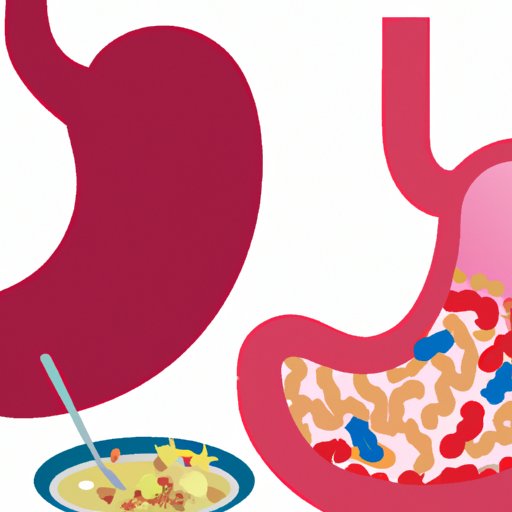Introduction
An ulcer is a type of sore that develops on the mucous membrane of the digestive tract. It is caused by an imbalance between digestive juices (such as acid) and the protective mucous lining of the stomach. The most common symptom of an ulcer is a burning pain in the abdomen, which can be relieved temporarily by eating certain foods.

Avoid Spicy and Acidic Foods
The first step in creating a diet plan for ulcers is to avoid certain foods that can aggravate the condition. Spicy and acidic foods, such as tomatoes, citrus fruits, and chili peppers, should be avoided as they can worsen the symptoms of an ulcer. Fried and greasy foods should also be avoided, as they can increase stomach acid production.
Choose High-Fiber Foods
High-fiber foods, such as whole grains, legumes, fruits, and vegetables, are beneficial for people with ulcers. According to a study published in Nutrition Reviews, fiber has been shown to reduce inflammation in the stomach and protect against ulcer formation. Fiber can also help to reduce symptoms of bloating, constipation, and diarrhea associated with ulcerative colitis.
Focus on Lean Proteins
Lean proteins, such as fish, poultry, eggs, and tofu, can also help to reduce symptoms of ulcers. Protein helps to build and repair tissue, and it can help to reduce inflammation in the stomach. Additionally, protein helps to keep you feeling full longer, which can help to prevent overeating and reduce the risk of developing new ulcers.
Incorporate Probiotics
Probiotics are beneficial bacteria found in certain foods, such as yogurt, kefir, and fermented vegetables. Studies have shown that probiotics can help to reduce inflammation in the gut, which can help to reduce symptoms of ulcers. Additionally, probiotics can help to restore the natural balance of bacteria in the digestive tract, which can help to reduce the risk of developing new ulcers.
Eat Small Meals Throughout the Day
Eating smaller meals more frequently throughout the day can help to reduce the symptoms of ulcers. Eating large meals can cause the stomach to produce more acid, which can lead to discomfort and pain. Eating smaller meals, however, can help to keep the stomach from becoming overly full and reduce the amount of acid it produces.
Drink Plenty of Water
Staying hydrated is important for people who suffer from ulcers. Drinking plenty of water can help to reduce the risk of dehydration, which can exacerbate ulcer symptoms. Additionally, drinking water can help to flush out toxins from the body, which can help to reduce inflammation in the stomach.
Cook with Anti-Inflammatory Herbs and Spices
Certain herbs and spices, such as turmeric, garlic, ginger, and cayenne pepper, contain anti-inflammatory properties that can help to reduce symptoms of ulcers. Incorporating these herbs and spices into your meals can help to reduce inflammation and pain in the stomach, while adding flavor to your dishes.
Conclusion
Eating properly and making smart dietary choices can help to reduce the symptoms of ulcers. Avoiding spicy and acidic foods, choosing high-fiber foods, focusing on lean proteins, incorporating probiotics, eating small meals throughout the day, and drinking plenty of water can all help to reduce inflammation in the stomach and provide relief from ulcer pain. However, if symptoms persist, it’s important to consult a doctor for further advice.
(Note: Is this article not meeting your expectations? Do you have knowledge or insights to share? Unlock new opportunities and expand your reach by joining our authors team. Click Registration to join us and share your expertise with our readers.)
